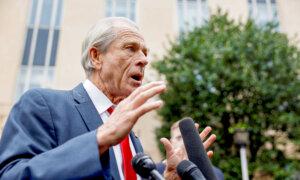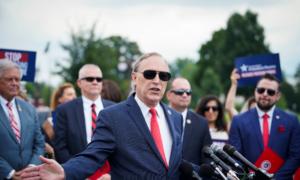The former Trump White House aide is slated to report to prison on March 19.
The Supreme Court’s chief justice on March 18 rejected former Trump White House aide Peter Navarro’s emergency petition to delay his prison sentence.
The decision comes a day before Mr. Navarro is set to report to federal prison to serve out his four-month sentence for defying a congressional subpoena.
In issuing the order, Supreme Court Chief Justice John Roberts said he had “no basis to disagree” with the appeals court ruling, though he added that the finding would not affect the outcome of Mr. Navarro’s appeal.
Mr. Navarro was convicted in September on two counts of contempt of Congress after he failed to comply with a subpoena from the House Jan. 6 select committee.
His initial request to delay his sentence pending appeal was denied in February by U.S. District Judge Amit Mehta, who held that the trade adviser to former President Donald Trump failed to present any substantial questions of law in his motion that would likely yield a better result.
“Appellant has not shown that his appeal presents substantial questions of law or fact likely to result in reversal, new trial, a sentence that does not include a term of imprisonment, or a reduced sentence of imprisonment that is less than the amount of time already served plus the expected duration of the appeal process,” the three-judge panel ruled.
“For the first time in our nation’s history, a senior presidential advisor has been convicted of contempt of Congress after asserting executive privilege over a congressional subpoena,” Mr. Navarro’s attorneys wrote.
“Navarro is indisputably neither a flight risk nor a danger to public safety should he be released pending appeal,” they added.
In a March 15 letter, Rep. Andy Biggs (R-Ariz.) urged fellow Rep. Barry Loudermilk (R-Ga.), chairman of the House Administration Oversight Committee, to “conduct further oversight” over the committee’s decision to recommend contempt of Congress charges against former Trump administration officials.
“As you are likely aware, former White House Director of the Office of Trade and Manufacturing Policy Peter Navarro has been ordered to report to prison next week based on his refusal to comply with the demands of the committee that has been shown to be illegitimately constituted and hopelessly tainted,” Mr. Biggs wrote.
The congressman told The Epoch Times last week that his concern was that the committee’s work was influenced by political bias.
“That Mr. Navarro is required to report to federal prison for refusing to comply with an illegitimate committee’s demands is indicative of our nation’s two-tiered justice system,” Mr. Biggs said.
“Throwing political opponents behind bars is a cruel move more likely to be seen in communist China and banana republics around the world. We must swiftly bring this practice to an end if we hope to protect our republic.”
Mr. Navarro has been ordered to surrender himself to the Federal Correctional Institution in Miami by no later than 2 p.m. on March 19.
Meanwhile, the high court is set to hear oral arguments next month in another case involving Jan. 6—President Trump’s federal election obstruction case.
The former president’s legal team holds that presidential immunity exempts him from prosecution in the election case being brought against him by Justice Department special counsel Jack Smith. They also contend that, based on double jeopardy principles, President Trump cannot be prosecuted over conduct for which he was already impeached and acquitted by the U.S. Senate.
The Supreme Court will hear those arguments during the week of April 22.
Sam Dorman, Savannah Hulsey Pointer, Zachary Stieber, and The Associated Press contributed to this report.
Original News Source Link – Epoch Times
Running For Office? Conservative Campaign Consulting – Election Day Strategies!


